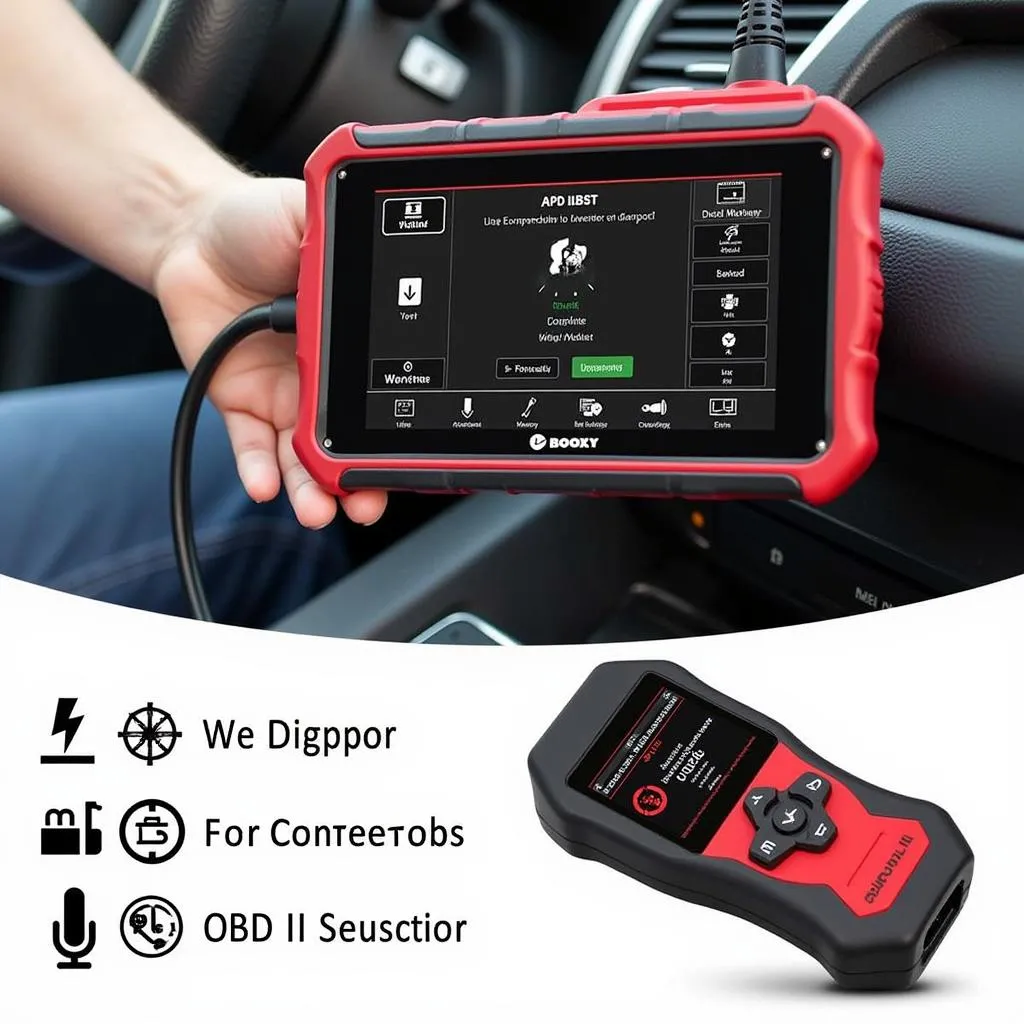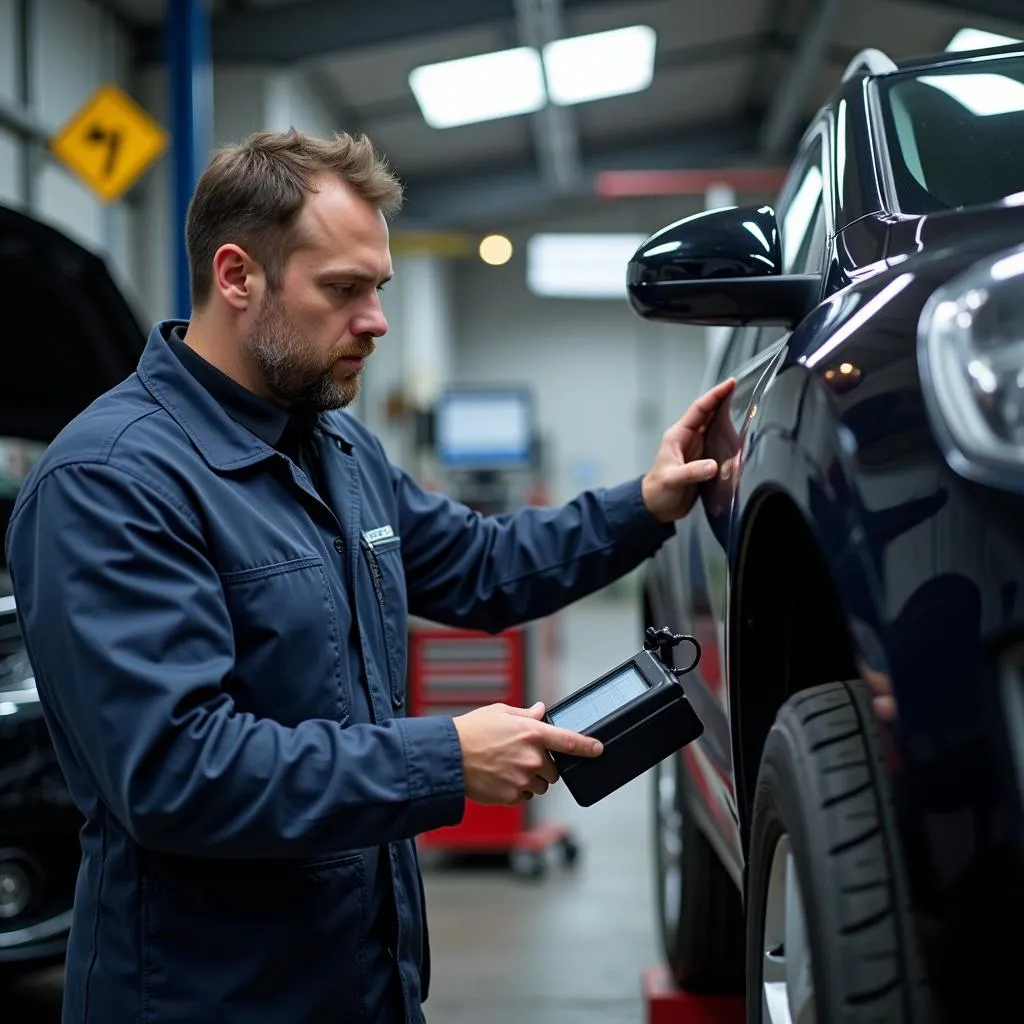When it comes to car repairs and maintenance, having the right diagnostic tool can save you time, money, and frustration. Two popular options are OBD II scan tools and CAN-Bus scanners. While they might seem similar, understanding their differences is crucial for making an informed decision. This article will delve into the specifics of each tool, helping you choose the perfect one for your needs.
 OBD II scan tool connected to a car's OBD port
OBD II scan tool connected to a car's OBD port
Unveiling the OBD II Scan Tool
An OBD II scan tool is a handheld device that connects to your car’s OBD II port, usually located under the dashboard on the driver’s side. It’s designed to access the data stored in your vehicle’s Engine Control Unit (ECU), providing valuable insights into its health and performance.
What can an OBD II Scan Tool do?
- Read and Clear Diagnostic Trouble Codes (DTCs): This is the most basic function, allowing you to identify the source of the “Check Engine” light and other warning indicators.
- View Live Data Stream: Monitor real-time sensor data, such as engine RPM, coolant temperature, and oxygen sensor readings, to analyze engine performance and diagnose potential issues.
- Perform Emissions Tests: Determine if your vehicle is ready for an emissions test and identify potential problems beforehand.
Who are OBD II Scan Tools for?
OBD II scan tools are ideal for:
- Car owners: Empowering you to troubleshoot basic car problems, saving trips to the mechanic for minor issues.
- DIY enthusiasts: Offering a deeper understanding of your car’s inner workings and aiding in more involved repairs.
 Mechanic using a CAN-Bus scanner for in-depth car diagnostics
Mechanic using a CAN-Bus scanner for in-depth car diagnostics
Diving Deep with CAN-Bus Scanners
A Controller Area Network (CAN) Bus scanner is a more sophisticated diagnostic tool that goes beyond the capabilities of a standard OBD II scan tool. It accesses the various control modules within a vehicle, including the engine, transmission, ABS, airbags, and more.
What makes a CAN-Bus Scanner Different?
- Advanced Diagnostics: Access and diagnose a wider range of vehicle systems, not just engine-related issues.
- Bi-directional Control: Interact with and control vehicle systems to test components, actuators, and modules, a feature not available with most OBD II scanners.
- Programming and Coding: Perform software updates, module programming, and key coding, making it a valuable tool for specialized repairs.
Who needs a CAN-Bus Scanner?
CAN-Bus scanners are essential for:
- Professional Mechanics: Providing the comprehensive diagnostic and programming capabilities required for complex repairs.
- Advanced DIYers: Allowing experienced individuals to undertake more advanced diagnostics and repairs on their own.
Making the Choice: OBD II Scan Tool or CAN-Bus Scanner?
Choosing the right tool depends on your needs and expertise:
- For basic diagnostics, code reading, and clearing, and monitoring engine performance, an OBD II scan tool is a cost-effective and practical choice.
- For in-depth diagnostics, module programming, and bi-directional control, a CAN-Bus scanner is necessary, but it comes at a higher price point.
FAQs
1. Can I use an OBD II scan tool on any car?
OBD II scan tools are compatible with most cars manufactured after 1996 in the United States. However, it’s essential to check your vehicle’s compatibility before purchasing.
2. Are CAN-Bus scanners compatible with all car makes and models?
CAN-Bus scanners offer broader compatibility but might require specific software or adapters for different car makes and models.
3. Can I program my car with an OBD II scan tool?
Most OBD II scan tools do not offer programming capabilities. You would need a dedicated CAN-Bus scanner or a professional-grade tool for such tasks.
Exploring Further
For more insights into specific scan tool types, check out:
Need Help? We’re Here!
Choosing the right diagnostic tool can be daunting. If you have any questions or need assistance in selecting the best option for your needs, don’t hesitate to reach out.
Contact us via:
- WhatsApp: +1(641)206-8880
- Email: [email protected]
- Visit us at: 276 Reock St, City of Orange, NJ 07050, United States.
Our dedicated support team is available 24/7 to assist you!


